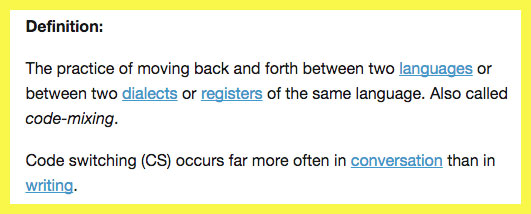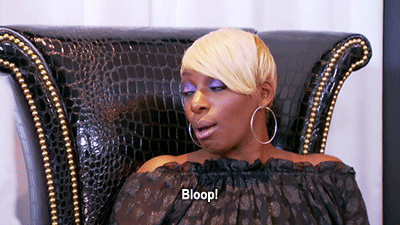5 Challenges Black & POC Makeup Artists Have To Deal With
[3] People Disrespecting Our Colloquialisms, Dialects, and Slang.
Yaaaaaaassss! She is BEAT to capacity! Brows on FLEEK! BAE looks gorgeous in that red lip! How many of you understood what I just typed? For the un-hip, the words yaaaasss, beat, fleek, and bae are all colloquialisms used in the African American dialect of English, also known as AAVE (African American Vernacular English)

DISCLAIMER: I feel like I need to state the obvious. NOT ALL BLACK PEOPLE SPEAK AAVE. Just like not all white people speak German. As a matter of my location, socio-economic class, and socialization, I was introduced to and raised to speak both Standard English and a dialect of Standard English called AAVE. There are many black people who do not speak the AAVE dialect.
My speaking habits are the same as someone who speaks Spanish at home or when communicating with other Spanish-speaking people, but speaks Standard English when in the office, or when communicating with someone who does not speak Spanish. This is called code-switching:

I can’t tell you how many times I have been shamed for speaking in my AAVE dialect in public. The shaming seems to always confuse me, mostly because AAVE is a widely-spoken, widely-heard, and widely-understood dialect of English. AAVE is the official language of rap and hip-hop, as much as Spanish is the official language of bachata! Because of the influence of black musicians in popular music, it is rare to find someone who has not encountered AAVE. However, I, and others, get humiliated by white, POC, AND black people who do not speak AAVE. I cannot tell you how many times I have seen people passive-aggressively post on Facebook: “Can ya’ll stop saying ‘On Fleek?! It’s ghetto. It’s not real English” or “Stop saying bae! It’s stupid! It’s Danish for poop!”
What about those words makes the people saying them, or the words themselves, stupid? Do you also tell Jewish/Yiddish-speaking people not to say “oy vey!” or “mazel?” Of course not. That is because those words have meaning to the people who speak that language. If someone around you is using words that you do not understand, it is likely because they were not intending for you to understand them in the first place.
 So why the backlash against AAVE, but not Yiddish? Attitudes about languages and dialects are formed through the lens of cultural hegemony. Cultural hegemony is the domination of a diverse society by the ruling class, through manipulations of the belief systems, perceptions and social representation, values and common practices, such that worldviews beneficial to the ruling class are elevated and accepted as the norm and the dominant value that legitimates the social, political, and economic status quo.
So why the backlash against AAVE, but not Yiddish? Attitudes about languages and dialects are formed through the lens of cultural hegemony. Cultural hegemony is the domination of a diverse society by the ruling class, through manipulations of the belief systems, perceptions and social representation, values and common practices, such that worldviews beneficial to the ruling class are elevated and accepted as the norm and the dominant value that legitimates the social, political, and economic status quo.
Simply Explained: Because American society does not value black people, it also does not value our language(s). Cultural hegemony demands that all things that do not comply with white American norms are wrong, unprofessional, misunderstood, and not of value. Black people and non-black POC are raised under white cultural hegemony too! Minorities are also taught and influenced and encouraged to devalue their own cultures. This is why you will find black people and POCs who do not value the cultural norms of other persons of color. Not until someone white does, anyway [read: Kylie Jenner & Eminem].
This is why non-AAVE-speaking people will say to us: “Fleek is not a word.” :::clutches chest::: It isn’t? Try telling that to the hoards of people who understand its meaning just fine. It isn’t a word TO YOU, but it is a word TO ME. AAVE –> IS ENGLISH. Therefore, “fleek” is also English. The dynamic that is happening in these exchanges is the delegitimization of my language, as a way to embarrass me, or to elevate the person admonishing me. And in all honesty, the person trying to “correct” me likely does not realize what they are doing. Hegemony is an engraining of attitudes the ruling class deems as legitimate and proper. These people are raised their whole life to devalue what does not mirror their own cultural norm. Cultural hegemony relies on SUBCONSCIOUS BIAS, so their disdain feels normal to them. This is why people will be upset and confused when you confront them on their negative perception of AAVE.
I always laugh when it happens, because I am never even talking to the demographic of people who do not understand those words. Literally… NEVER. As with anyone who speaks multiple languages and dialects, you are always aware of your audience. I would not show up to my doctor’s office or a job interview speaking AAVE, since I know that Standard English is the dialect expected for communicating in those settings. So really, these people who “correct” my dialect are being antagonistic and oppressive. No one was speaking to them to begin with. When I am speaking to people I am familiar with, or to my fans, or on any platform that I own, I will speak in whatever dialect or language I see fit to communicate with.
And what really kills me is when another black or POC person “corrects” or admonishes me for using AAVE. Especially when I know that they understand EXACTLY what I am talking about. The whole exchange is just an exercise in respectability politics.

This is a constant battle for us when expressing pride in our work, or when complimenting a fellow AAVE-speaker. We are always being subjected to the eyes and ears of people who want to shame us and delegitimize the legitimate language that we speak. Be prepared for it!
[4] Cultural Appropriators.
Sugar Sculls. Corn Rows. Native American War Bonnets. Geisha Makeup. Henna. DEAR GOD SAVE ME.
Who taught people that it was okay to take culturally-significant pieces of people’s identity, and wear it as a costume? WHO? Show me the bastard.

One of the regularly dehumanizing aspects of our job is having work on gigs that require us to apply culturally-appropriative makeup. Doing an editorial on Japanese streetwear? Oh, well you know that Geisha makeup is on the art director’s menu. Doing a spread on tribal prints? You can probably expect to see an inspiration board full of sacred tribal markings being supplied for you to copy onto the model’s forehead. Got a white model that you need to make look edgy? Corn rows and baby hair it is. No part of anyone’s culture is sacred when capitalism and entitlement have anything to say about it.

It is especially soul-crushing for me to be asked to participate on jobs where I KNOW culture is being appropriated. For instance, I have been asked by clients to do a sugar skull makeup for Halloween, and I turn it down. EVERY. SINGLE. TIME. Why is doing sugar scull makeup culturally appropriative you ask?
In these modern times, Halloween is associated with trick or treating, costumes, and candy. It’s also associated with the grotesque, horror and fear. It is largely a hedonistic holiday all about indulging in food, sweets, and alcohol. Costumes vary between terrifying, provocative, hillarious, and strange. In short, it is a holiday all about the self.
Día de los Muertos, on the other hand, is a holiday honoring deceased relatives and friends. Rooting from the Catholic All Souls’ Day as well as Aztec and other indigenous beliefs, it is a vibrant holiday that bears little resemblance to the Halloween we celebrate today. Food, candles, and Calaveras are brought to the graves of those who have passed on as ofrendas, or offerings. Marigolds are used in abundance due to the belief that they invite the spirits of the dead back to earth. Contrary to the spooky connotations of Halloween, Día de los Muertos is a bright, cheerful celebration. [SOURCE]
Playing dress-up in people’s culture is insulting and erasing, but it has somehow become a staple of mainstream American culture. This attitude is a by-product of American entitlement. People feel like it is their right to “explore, experience, and extract” anything that is exotic or unknown. Manifest Destiny. It’s that Christopher Columbus rape-and-pillage spirit that we are taught to romanticize from our Kindergarten years on up. And I rebuke it!

Comments are closed, but trackbacks and pingbacks are open.